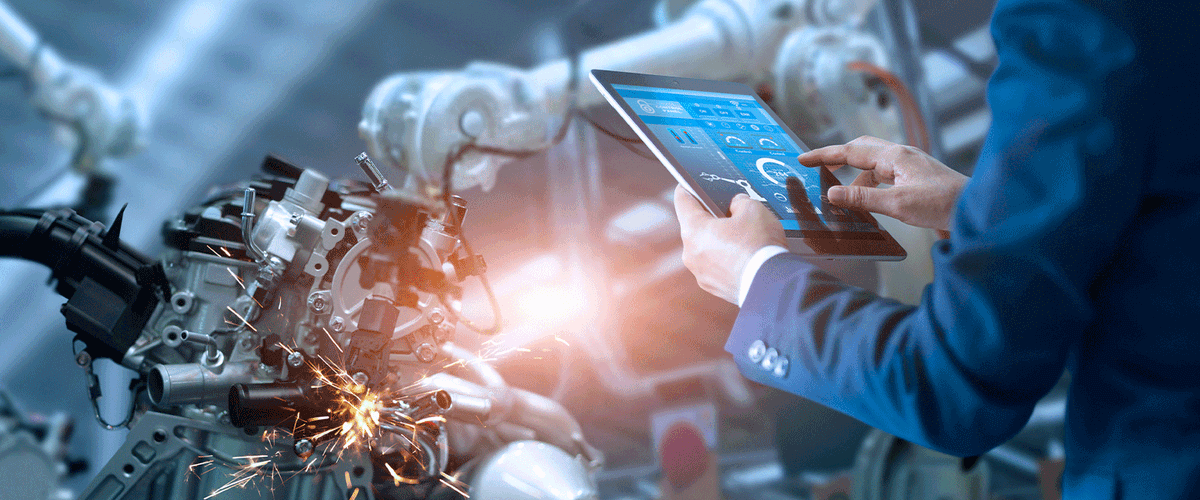Automation & Control
Automation & Control combines engineering with machine-learning in order to provide industrial systems with the information necessary to work in an automatic and controlled manner. Research areas include: atomic force microscopy, bio-inspired control, discrete-event systems, formal languages for robot mission specification, hybrid systems, image-guided surgery, networked control systems, robot path planning and control, robotic swarms, and UAV flight control.
Reinforcement Learning: A More Efficient Way for Robots to Learn
Robot nurses — myth or reality? Although this may sound far-fetched, there are already hospitals in which robots assist nurses by bringing them tools, allowing the nurses to focus on providing care to their patients more efficiently. Vittorio Giammarino, a fifth-year PhD candidate (SE) at Boston University, hopes that his work can be useful for […]
Shifting the Purpose of Robots From Serving Humans to Collaboration
In dire situations like fires, time is of the essence. Firefighters need to work quickly to extinguish the fire and rescue any people. However, with emerging technologies like robots, putting out fires might become easier. Mela Coffey 3rd year ME PhD Candidate (Advisor: Alyssa Pierson) is interested in contributing to collaborative human-robot systems and human-robot […]
Learning From Animal Behaviors to Inform Control Systems
You may be familiar with the term “blind as a bat”, which is used to describe someone who has poor eyesight. However, recent research on animal behavior by CISE affiliate and Distinguished Professor of Engineering John Baillieul (ME, ECE, SE) found that this phrase is a misconception and many species of bats rely on visual […]
Sabelhaus Research: Advancing the Safety of Soft Robots for Human Interactions
The emergence of soft robots will enable safe human interactions which will allow robots to assist in the industrial, medical, automotive and space industries. College of Engineering Professor Andrew Sabelhaus (ME, SE), has been working on making soft robots safer to improve these human interaction tasks, in areas such as medicine, as well as […]
Unified Vision-Based Motion Estimation and Control for Multiple and Complex Robots
The project enables teams of robots to collaborate on physical tasks, such as assembling a building from prefabricated components under the direction of a human worker. In such settings, each robot might be equipped with cameras to orient itself and have some limitations on how it can move. To achieve the robotic team’s goals, each […]
FRR: Towards Robust and Perceptual Inclusive Mobile Robots
As prototypical intelligent mobile systems, from autonomous vehicles to delivery robots, move from their controlled development labs into the real-world, their impact on individuals with disabilities becomes discernible. An intelligent system that fails to account for diverse reactions and mobility characteristics among individuals can have dire consequences. For example, a delivery robot may inadvertently cause […]
New Technology Could Predict When Someone’s Mobility is Declining
CISE Faculty Affiliate Roberto Tron uses Visual-Inertial Filtering for Clinically-Relevant Human Walking Quantification As we age, the likelihood of falling and getting injured increases. But what if we could prevent these accidents from happening? CISE faculty affiliate Roberto Tron is working on preventing injuries by monitoring mobility through cameras, sensors, machine learning, and estimation algorithms […]
Collaborative Research: CPS: Medium: An Online Learning Framework for Socially Emerging Mixed Mobility
Emerging mobility systems, e.g., connected and automated vehicles and shared mobility, provide the most intriguing opportunity for enabling users to better monitor transportation network conditions and make better decisions for improving safety and transportation efficiency. However, different levels of vehicle automation in the transportation network can significantly alter transportation efficiency metrics (travel times, energy, environmental […]
CISE awarded $8.8M to develop the next-generation robotics and autonomous systems workforce
The Boston University Center for Information and Systems Engineering (CISE) received an $8.8 million award to fund a new center called the BU Robotics and Autonomous Systems Teaching and Innovation Center (BU-RASTIC). The award, including $4.4M from the Innovation Institute at the Massachusetts Technology Collaborative (MassTech) and $4.4M matching funds from Boston University, will serve to […]
Advancing Smart Cities with the Internet of Cars
Quicker, Safer and Greener Intersections Intersections with Dynamic Traffic Control In road transport engineering, an intersection is defined as at-grade junction where two or more roads or streets meet or cross. Statistically, it has been evidenced that intersections present a major hurdle in traffic control as they account for the lion’s share of accidents and of […]
